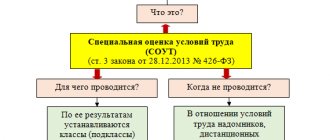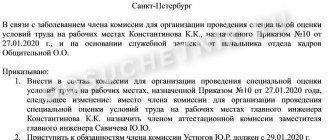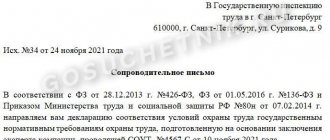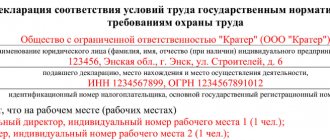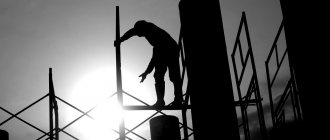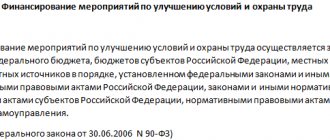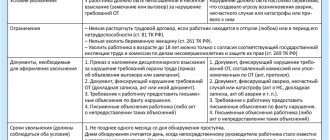When is a special assessment of working conditions carried out?
According to Part 6 of Art. 10 Federal Law of December 28, 2013 No. 426-FZ “On Special Assessment of Working Conditions” identification of potentially harmful and (or) dangerous production factors is not carried out in relation to:
1) workplaces of workers, professions, positions, specialties of which are included in the lists of relevant works, industries, professions, positions, specialties and institutions (organizations), taking into account which the early assignment of an old-age insurance pension is carried out;
2) workplaces in connection with the work in which employees, in accordance with legislative and other regulatory legal acts, are provided with guarantees and compensation for working under harmful and (or) dangerous working conditions;
3) workplaces where, based on the results of previously conducted certification of workplaces for working conditions or a special assessment of working conditions, harmful and (or) dangerous working conditions were established.
For these workplaces, a special assessment of working conditions can be carried out in stages and must be completed no later than December 31, 2022.
The results of the special assessment of working conditions are subject to transfer to the Federal State Information System for recording the results of the special assessment of working conditions. The responsibility for transmitting the results of a special assessment of working conditions rests with the organization conducting the special assessment of working conditions.
Important! After December 31, 2022, the State Labor Inspectorate is obliged to verify compliance with the requirements of the law on labor safety standards.
Initially, the State Labor Inspectorate conducts an automated check , comparing information received in the Federal State Information System for recording the results of a special assessment of working conditions, and information available from the Federal Tax Service and the Pension Fund of the Russian Federation.
After the information obtained as a result of the special labor inspection is entered into the information system, the employer can only provide a declaration, which the State Labor Inspectorate can also check automatically.
The register of declarations of compliance of working conditions with state regulatory requirements for labor protection is posted on the Rostrud website.
How to compile a list of jobs subject to special assessment?
Mandatory preparatory activities precede the implementation of the SOUT. First of all, a special commission is formed. She draws up a schedule and list of jobs, which is approved by the chairman of the commission and certified by all its members.
The law does not define a standard document for drawing up a list of places, so the employer is allowed to draw it up in any form. It states:
- full name of the organization (the list can be compiled on company letterhead);
- under the heading I APPROVED the name of the chairman of the commission for conducting SOUT in the organization, his signature and date of approval;
- document's name;
- the tabular section lists each workplace to be assessed, including typical ones in terms of their characteristics and parameters (similar);
- the number of employees carrying out their labor activities at the specified workplace;
- full address of the workplace location;
- a comment indicating whether several places are similar;
- positions, full names, signatures of each member of the commission for conducting the special assessment and the date of signing the document by each of them.
When filling out the name of the workplace, it is recommended to adhere to the staffing table and qualification directories to indicate the position, profession or specialty of the employee. For example, “battery operator’s workplace”, “system administrator’s workplace”, etc.
How can I find out about SOUT inspections?
In addition to automated inspections, the State Labor Inspectorate organizes inspections:
- planned;
- unscheduled.
Rostrud organizes inspections in accordance with the order of the Ministry of Labor and Social Protection of the Russian Federation dated October 30, 2012 No. 354n “On approval of the Administrative Regulations for the execution by the Federal Service for Labor and Employment of the state function of exercising federal state supervision over compliance with labor legislation and other regulatory legal acts, containing labor law norms.”
According to Art. 9 of the Federal Law of December 26, 2008 No. 294-FZ “On the protection of the rights of legal entities and individual entrepreneurs in the exercise of state control (supervision) and municipal control” the subject of a scheduled inspection is compliance by a legal entity, individual entrepreneur in the process of carrying out activities with mandatory requirements and requirements established by municipal legal acts, as well as compliance of the information contained in the notification of the commencement of certain types of business activities with mandatory requirements.
Scheduled inspections are carried out no more than once every three years.
Scheduled inspections are carried out on the basis of annual plans developed by state control (supervision) bodies and municipal control bodies in accordance with their powers.
In what cases will an unscheduled inspection be carried out according to the SOUT?
In accordance with paragraph 69 of the order of the Ministry of Labor and Social Protection of the Russian Federation dated October 30, 2012 No. 354n, the grounds for authorized officials of Rostrud and its territorial bodies to carry out an unscheduled inspection of compliance by a legal entity or individual entrepreneur with mandatory requirements are:
- expiration of the deadline for the employer to fulfill the order to eliminate the identified violation of the requirements of labor legislation and other regulatory legal acts containing labor law norms;
- receipt by Rostrud or its territorial body of: appeals and statements from citizens, including individual entrepreneurs, legal entities, information from state authorities, local governments, trade unions, from the media about facts of violations by employers of the requirements of labor legislation and other regulatory legal acts containing labor law standards, including labor protection requirements, which entailed a threat of harm to the life and health of workers, as well as leading to non-payment or incomplete payment on time of wages, other payments due to employees, or the establishment of wages in the amount less than the amount provided for by the labor legislation of the Russian Federation;
- an employee’s appeal or statement about the employer’s violation of his labor rights;
- an employee’s request to conduct an inspection of labor conditions and safety at his workplace;
- availability of orders from the head (deputy head) of Rostrud to conduct an unscheduled inspection, issued in accordance with the instructions of the President of the Russian Federation or the Government of the Russian Federation, or the head (deputy head) of the territorial body of Rostrud, issued on the basis of the prosecutor’s request to conduct an unscheduled inspection as part of supervision of execution laws on materials and appeals received by the prosecutor's office.
What jobs are subject to SOUT?
All workplaces in the organization must be tested for exposure to external factors. The exceptions are places:
- employees working at home or remotely;
- personnel working under an employment contract with an individual who does not have the status of an individual entrepreneur.
The legislation contains the concept of similar jobs. For them, a special assessment is carried out only in 20 percent of the total number (but not less than two). The certification results will be applicable to all conditions and parameters that are the same, i.e. similar jobs.
Even office workers, whose workplaces also need to be assessed for various external influences, are covered by Law 426. Employees with a non-permanent location, i.e. traveling nature of work, for example, drivers, are also included in the list of those certified, but the report records the time spent directly behind the wheel and exposure to relevant factors.
SOUTH must be carried out as planned once every five years and unscheduled in the following situations:
- the organization has changed its location (moved to another premises) or the workplace has been moved to another building and needs to be put into operation;
- new jobs have been created in the organization;
- the production process and the composition of the raw materials used have changed significantly;
- fundamentally new equipment was introduced;
- there was an accident at work;
- the labor inspector issued an order requiring unscheduled measures to assess the workplace;
- protective equipment (individual and collective) has been changed, which may affect the impact of harmful factors on the body of workers;
- The initiative to conduct an unscheduled SOUT was taken by a representative body of the team, for example, a trade union.
Employer's responsibility for the results of inspections
In accordance with clause 9 of the order of the Ministry of Labor and Social Protection of the Russian Federation dated October 30, 2012 No. 354n, the result of the execution of the state function is inspections carried out by authorized officials of Rostrud and its territorial bodies of employers’ compliance with mandatory requirements in order to identify and suppress labor violations, eliminating their consequences and implementing measures to prevent similar offenses.
The end of the execution of a state function in relation to a specific employer is the delivery of an act of verification of compliance with mandatory requirements, in accordance with which it is necessary to carry out work to eliminate violations.
In accordance with Art. 5.27.1. The Code of Administrative Offenses of the Russian Federation, failure to comply with the requirements for carrying out special labor safety measures is regarded as a violation of state requirements in terms of labor protection and entails the following sanctions:
| Violator category | Administrative punishment |
| Executive | Warning or fine 2000-5000 rubles. |
| Individual entrepreneur | Fine 2000-5000 rubles |
| Entity | Fine 50,000-80,000 rubles |
| In case of repeated violation | |
| Executive | Fine 30,000-40,000 rubles or disqualification for 1-3 years |
| Individual entrepreneur | Fine 30,000-40,000 rubles |
| Entity | Fine 100,000-200,000 rubles or suspension of the enterprise for up to 90 days |
Normative base
Order of the Ministry of Labor of Russia dated January 24, 2014 N 33n “On approval of the Methodology for conducting a special assessment of working conditions, the Classifier of harmful and (or) hazardous production factors, the report form for conducting a special assessment of working conditions and instructions for filling it out.”
Failure to take labor protection measures may result in for the employer:
- a fine of up to 200,000 rubles;
- administrative suspension of production activities for up to 90 days;
- imprisonment for up to 5 years.
Questions and answers
Question No. 1. We had a special assessment of working conditions, but we, as employees, do not agree with the results. Can we somehow influence the current situation?
If you do not agree with the results of the SOUT, you have the right to contact the executive authority for labor protection of a constituent entity of the Russian Federation and request an examination of the quality of a special assessment of working conditions.
Question No. 2. Our working hours have changed for some employees. Is it necessary to carry out a special assessment of working conditions in this regard?
No, due to changes in working hours, a special assessment of working conditions is not carried out.
Features of indicating similar jobs
Similar areas of professional activity include those located in the same production premises (or identical ones), equipped with the same type of equipment and tools, support systems, etc. The main factor here is the fact that employees belong to the same profession, position and perform the same job functions. In order to more correctly evaluate similar places, it is possible to attract special experts.
The features of similar areas of professional activity are as follows:
- they are located in one room or several rooms, but which are similar to each other in terms of conditions;
- are engaged in the same profession;
- the work is the same;
- The same equipment, materials and tools are used in the work.
